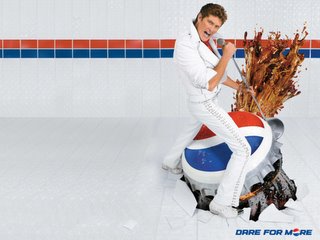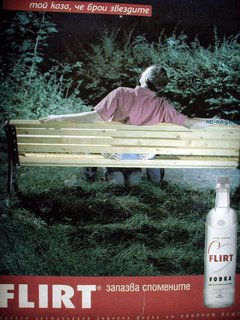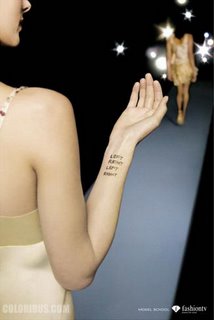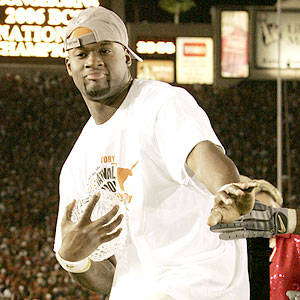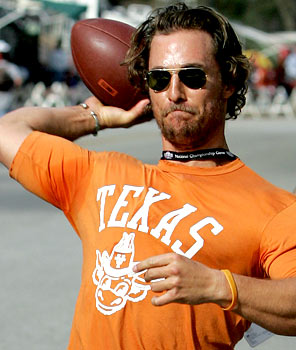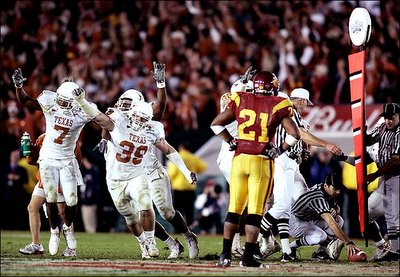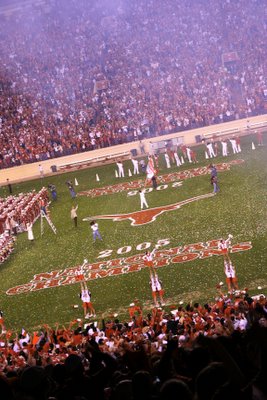The 2006 Adage Quick Reference Synopsis of the Year's Marketing and Advertising Data Pack has arrived. Download here for free.
Tuesday, February 28, 2006
Thursday, February 23, 2006
Interview with Ernie Schenck
 I recently interviewed Ernie Schenck about his career and its fascinating aspects. He also shares insights about jr. creatives. And being in a rock band. Yes, it's the same Ernie Schenck that writes those neat articles in Communication Arts.
I recently interviewed Ernie Schenck about his career and its fascinating aspects. He also shares insights about jr. creatives. And being in a rock band. Yes, it's the same Ernie Schenck that writes those neat articles in Communication Arts.
(excerpted from his blog. After seven years as creative director of the highly regarded advertising agency, Leonard Monahan Saabye, Ernie left in 1986 to co-found Pagano Schenck & Kay, universally considered to be one of the hottest shops of the Eighties.
He left PSK in 1989 to become a free agent. During that time, he worked on assignments for Royal Caribbean Cruise Line, Miller Lite beer, United Airlines, Dreamworks SKG, Volkswagen, Sperry Topsider, Winthrop Resorts International, Saucony and many other brands...
In 1999, he left Interpublic’s Hill Holliday in Boston to freelance and has since worked for some of the top agencies and clients in the country including Fallon, Chiat/Day, BBDO, McKinney + Silver, Publicis and Hal Riney, GSD&M, Ogilvy, Kirschenbaum & Bond, and Young & Rubicam...AdWeek has called him "one of the stars of the freelance world." Twice, he has been named to the AdWeek All Star Creative Team, both as Creative Director and Copywriter.
Ernie’s work has been consistently acknowledged at The One Show, Communication Arts awards, Cannes Film Festival, Clios, Great Britain’s D&AD awards, New York Art Directors, and others...In the United Kingdom, he has been named Print Copywriter of the Year at the Design & Art Direction awards and is one of the only American advertising creative people ever to achieve that honor...
In the 1997 Clio Awards, he won a total of 10, including the Grand Clio for client, John Hancock. A 90-second spot for John Hancock, “Sarajevo”, was an Emmy Award nominee for best commercial of the year.
A columnist and contributing editor for Communication Arts magazine and a member of the Board of Directors for The One Club for Art and Copy, Ernie works from his offices on the island of Jamestown in Narragansett Bay, Rhode Island.
How did you start out in advertising?
I started out in a wretched little shop in Providence that handled mostly what were called industrial accounts. I was there for like a year when I discovered an awards annual at a local library and that was that. It was like stumbling onto the lost treasure of the Temples. I gave my notice the next day.
I'm dying to ask this question. It seems like advertising agencies take their name from a combination of the founder's surnames (DDB, GSD&M, PSK, TBWA and others). That doesn't happen in other businesses; there's neither a Gates, Allen & Partners nor a Wozniak, Jobs & Partners. Why do you think this is?
Well, that’s changing now as you know. The thing now is to name yourself something cool like Blue Ant or Strawberry Frog or Mother or whatever. Until recently though, those kind of names would have seemed schlocky and a bit tacky. As for the names on the door, well of course, it was ego.
As a former CD of two acclaimed agencies, what does it take for an agency to get hot and stay hot?
It’s a little different now with shops like Crispin and Anomaly and stuff like that. It’s not just about cool ads anymore. Crispin redefined all that. So if you’re winning a Titanium at Cannes, you’re definitely a hot property. But I think no matter which way the shifts come in the business, you have to be really visible, you have to understand what great creative is, and of course a lot of guys think they do but they don’t. Talent is everything. You have to willing to hire people that are smarter than you. Awards shows are a big deal and will continue to be in my judgment.
I've heard that agencies go through creative cycles. Right now CP+B is obviously at the top of one. Do you think Pagano Schenck & Kay would still continue to do great work today?
I think so, yeah, although we would have had to undergo a major lobotomy to get our brains off of doing advertising. The landscape of opportunities has gotten so enormous with so many ways to communicate with people, I think we might have a little trouble adapting to that but do I think we could have made the shift? Yes.
Can you talk about how advertising has changed, perhaps grown, from the Eighties to the Nineties to now?
To me, Fallon kind of defined the 80’s. In some ways, it was a throwback style of work and it had a lot in common I think with early Bernbach. Very clean. Very quick. Not a lot of embellishment. The 90’s were different. I think it was a great time to be a writer because I think words counted for more then. I have a reputation for being a long copy freak and it’s justified. I guess that’s why I always felt so connected with a lot of the work out of Singapore. Obviously, a pretty literate population there. I think it’s pretty different now. There’s so much emphasis on design. The whole country is suffering from ADD and that’s a fact, so stuff has to be pretty quick to digest. I think it sucks personally but what are you going to do.
Where do you see it going in the future?
I think integration is going to become an even bigger deal than it is now. I think the old media forms are going to look completely different. So many people are predicting the death of the TV spot and I think they could be right. Mobile will get bigger. Branded entertainment will continue to grow but only if it gets more sophisticated than it is at the moment.
What was it like working with Tom Monahan, David Lubars, Woody Kay, Steve Bautista, and other famous creatives?
Tom is a close friend. We grew up not 5 miles from each other. We had a rock band. Monahan followed me into the business when he found out that all I did all day was look out the window thinking up funny commercials. The fact that nobody cared if you wore your hair long wasn’t exactly lost on him either ☺ Dave Lubars came to Leonard Monahan and right off I knew this guy was something special. He really had an uncanny sense for the next thing, if you know what I’m saying. And just a great work ethic. You could shoot David’s stuff down until his brain was a bloody mash and he’d still keep coming at you with great work. You didn’t mention John Doyle, whom I worked very closely in the early 90s. Without a doubt, Doyle is the best print art director I ever worked with. Brilliant sense of literacy and style.
Do you have any advertising heros? (These can be past or present)
Very few. Mark Fenske. Jim Riswold. Charlotte Moore. Janet Champ.
What's your personal creative philosophy or style?
I try to look for signs of intelligence in a brand. That’s what I want to get to. I’m not so interested in shallow solutions. I mean, I can do them but I feel a lot better when I can get my head around something substantive, something that lets me get into a place where I can touch someone in a fairly deep way. I think this is why I mention Fenske and Riswold and Janet and Charlotte. They all have that ability.
You must have presented hundreds of thousands of ideas to clients already. How did you learn how to present and sell your agency's ideas?
For most of career, I HATED presenting. Despised it. Sucked at it. I would do whatever it took to get someone else to present the work. I’ve been a stutterer all my life so that didn’t help. But lately, I seem to have come out of my shell. A lot. And I’m discovering that I actually enjoy this so there’s been a shift there. What I’ve found though is that clients really are pretty receptive if you can give them a rational point of view.
You've worked for several different agencies in several different cities. Which cities did you like working in the most? and why?
I never actually worked anywhere but Rhode Island. I did a permalance gig with GSD&M for a while but I never moved to Austin. The time with Doyle, I never actually worked in Boston. That said, I think Boston is pretty cool. Easy to get around. Great museums. Colleges. But I guess my favorite city is Jamestown. Okay, not city. Weenie little coastal village in Rhode Island. Seriously, it’s where I’ve done just about every good thing I’ve ever been associated with.
You've had a career that many a creative would die for. What are some of the highs and lows of it?
I think when Doyle Advertising went out of business in the mid-90s, I felt pretty bad about that. John and I had been on such a roll and I hated to see that end. But life went on. Another chapter started. A really high point for me was, believe it or not, leaving Pagano Schenck & Kay. It got me out into the world. It forced me to connect with so many other great people all over the country and none of that would have happened if I had stayed in my safe little cocoon.
What are the most common mistakes you observed jr. creatives make?
I absolutely hate it when juniors are so desperate to get a job, they’re willing to work for nothing just to get in the door. That’s stupid. I’d take a paying job in the mailroom before I took a junior art director job for no money. You’ve got to respect who you are and show a CD what you’re made of. Mind you, asking for the sun and moon is pretty stupid, too. You might think you know everything but you know exactly shit. The idea is to get paid fairly. The only other thing I’d say is stop relying so much on your computer to make great stuff. It’s low tech, I know, but I still think a pencil and pad are more organic and get you closer to the soul of your creative self.
What is the top ten list of advice that you have for jr. creatives?
1. Look for your inspiration anywhere but awards show books.
2. Rely less on technology when concepting. A cool layout is not an idea.
3. Show some guts
4. Be humble
5. Talk less and listen more.
6. Any bright creative person can think outside the box. The great ones can do it inside.
7. Humor isn’t everything. Get comfortable with other emotions.
8. Buy my book when it comes out this Fall.
9. Buy my book when it comes out this Fall.
10. Buy my book when it comes out this Fall(to be published by McGraw Hill in the spring of 2006).
What separates jr. creatives in the hiring process?
If you just read my top 10 list, you already know the answer to this one.
By David Wen 2 comments
Labels: advice
Monday, February 20, 2006
Interview with Ignacio Oreamuno

I recently interviewed Ignacio Oreamuno about life as a jr. creative. You may have heard of him from a website he started (ihaveanidea).
(taken from ihaveanidea) Born in sunny Costa Rica, Ignacio has never lived longer than 5 years in one single country. After traveling the world in pursuit of his advertising dream, Ignacio was left frustrated with the elitist structure of the ad industry and its non-existent community. One cold night, without asking for anyone’s permission he decided to take the reins of the industry he so much loved and created ihaveanidea.
The dream was simple, create an online interactive brain that would allow fellow creatives to share their valuable knowledge and build on each other's experience, hence forming the next generation of the advertising industry.
Soon after starting, Ignacio was joined by other fellow volunteer creatives who sided by the ihavanidea plight. His art director job at Ogilvy kept Ignacio busy working on IBM, Kraft, Unilever and Motorola for a while, but attempting an advertising revolution while doing comps at the same time proved a little too much too handle and after a great time at Ogilvy, Ignacio decided to take the challenge of fulfilling ihaveanidea's mission full time on 2004.
Ignacio holds a Bachelor Degree in Business Administration, a Bachelor Degree in Public Relations & Business Communications, a Diploma in Advertising Design and a Professional Degree in Web Development. He was named Marketing Magazine's Ones to Watch under 30 in 2004.
He doesn't smoke, but he's a social drinker. (He's also very social.)
Do you miss being at Ogilvy?
It's a big thrill working for big clients like IBM, Motorola, Unilever
and Kraft. It's fun pitching for a 300,000 dollar spot or doing a
meeting with 20 people trying to convince them why your idea with a
pro NFL athlete is going to be a cool spot that will sell phones and
stuff. I got to ride in big cranes in the middle of Toronto while
shooting spots, have dozens of people work day and night to shoot my
little ideas, and even closed down the ACC where the Toronto Maple
Leafs play to shoot an ad for IBM. We virtually got the remote control
for the Jumbotron to lift it up and down and we got to skate in the
ice at night. I also loved expensing all my DVDs, magazines and books.
I had the best bosses in the world, Janet and Nancy (Janet Kestin and Nancy Vonk), which made the
job even better.
To be admitted into the TX Creative program is very hard. A lot
of my friends want to be a creative because it is "fun" and "cool."
What are the characteristics of a Creative? They're quirky, weird...
Before getting a job in advertising creatives may be quirky and weird
but all those get filtered out in the job hiring process. After that
only the hard working people are left. In the old days (70's and 80's)
people dressed weird and were very artsy fartsy. Nowadays, creatives
are pretty normal restrained people. In fact I find all other related
industries like Direct Marketing and Design have waaaaaaay cooler
people.
What should aspiring AD/CWs do outside the classroom to prepare
them to be better AD/CWs?
It's easy. If your teachers ask for 10 ads for your portfolio, then do
30 for yourself. If they ask for 3 ideas for a campaign, then do 10. A
career in advertising is all about ALWAYS doing a bit more than what
they ask of you. Those are the people that make it and thrive. The
rest stay back making flyers.
What's your personal creative philosophy?
Most of the best work I made was late at night in some restaurant
eating good food and drinking good beer while having a laugh (all
expensable!) Timelines are good. Creatives are lazy and we leave
everything till the last minute. Many of the best ideas are done under
lots of pressure.
I read that you have never lived longer than five years in one
country. Which countries have you lived in? Do you feel that your
global perspective has helped you in your thinking? Has it helped you
in your social skills too because you have a broader knowledge of
different cultures?
From living in Holland: You CAN work from 9-5 and be highly effective.
These guys can have a 20 minute meeting that in North America would be
the equivalent of 3-4 meetings over a period of two weeks. People are
empowered and take decisions. There's also no bullshitting. If they
don't like what you're offering it's dead. No hard feelings buddy.
From Spain: Take a 3 hour lunch and nap. Life is short
From Argentina: Be proud, always.
The big lesson from all these countries is that no culture is right.
Learn to see the good things in everything in life.
Holy smokes. You have three business-related degrees and one
diploma. How does having business knowledge help a jr. creative?
Not at all! Those diplomas are gathering dust next to my old tennis
balls in my garage. No one has ever asked me for my diplomas or even
yet, my resume. I thought gathering as many credentials as possible
was important, but in advertising, as a creative they mean squat!
However, in being a creative, EVERYTHING, even pottery classes help.
If just go to school and then hit an agency your mind might not be
open enough. Being a creative means being a student of life.
Everything you have studies, done and experienced will come back to
help you. However, if you have a Masters in Mass Communications don't
expect it to help you get a job as an AD/CW. Only the portfolios
matter.
What should students learn in a good portfolio program?
A good portfolio program is not about creating great ideas. Anyone can
do that. It's about polishing the book to a point that you become good
enough to hire. Creative Directors have way too many people offering
to work for free for you to have any chance if your portfolio is not
perfect. It's the responsibility of the schools to not let you out
without having a scratch free portfolio. This means that if you are an art director your design, typography, kerning, leading, colors usage, campaign consistency, etc is perfect and if you are a copywriter, that
every comma, period, space and adjective is there for a reason.
Do you think business etiquette should be taught at portfolio
schools/programs?
Yes!
Advertising is not about creating great ideas, it's about selling
them. Try presenting your idea to your classmates.Then imagine try
selling that same idea to the President, Vice-President, Marketing
Director, Brand Manager and lawyer from Kraft. Try to get them to drop
half a million dollars on your idea. If your etiquette and
presentation skills are not amazing your ideas will die, regardless of
how good they are.
What are the top five most important things you learned as an AD at
Ogilvy?
1. Typography is HARD. It's not about trying to find a good font. It's
about spending hours and hours and hours (that you don't have trying
to find the most amazing perfect typeface to match the design, brand
and idea you have crafted.
2. There will always be assholes in any agency you work in. Ogilvy was
amazing in terms of the amount of nice people that worked there.
However, there were a few assholes and no matter how many agencies you
go to, or how many times you change, you will always find them in your
career. Learn to live with that early in your career.
3. The success of your career will depend a lot on the chemistry
between you and your partner. Invest time building that relationship
and making it work. It's like a marriage.
4. No matter how much you learnt at school...you will start your
career without knowing a thing. Advertising is so hard because it
can't be taught. It's a do and learn career. You will be shocked at
how many things school can't teach you when you hit your first real
week of work.
5. Art direction is harder than you think. Legal, legibility, print
restrictions, color variations, etc will be a shock to you as a junior
ad.
What's the most important piece of advice you heard from a CD or
a fellow creative?
It's just advertising. We're not changing the world, just making ads!
So have fun!
Based on my personal, and limited professional advertising experience, it seems like in the advertising industry almost everybody wants to help you. Why do you think the industry has this quality?
What?!?
People helping people in advertising?
Just the opposite. Advertising has probably the worst community spirit
and industry of all the communication industries. Agencies live in
silos, creative directors don't answer phone calls, creatives that win
gold awards don't like creatives that don't win gold awards. It's a bunch of prima donnas. However, when you look hard you find a lot of amaaaaaaaazing people. That's why I created ihaveanidea. To pursue positive change in the industry and have a voice for the 'nice people'.
How do you get over a creative roadblock?
Throw everything in the trash. Go for a walk. Order some food and
drinks on the company and start again.
I was told that being humble and being observant are two very good
characteristics for a jr. creative to have. Do you agree? Do you
have any anymore to add on?
Yes these are very very important. Again, advertising is a do and
learn industry. It's sort of like becoming a blacksmith. You need to
learn from the master, that's the only way. It's easy to get carried
away and think you know it all, and get angry with your CD when they
kill your amazing ideas, but if you learn to be humble from day 1 you
will be respected and you will grow fast. Very few people make it to
the top being jerks. Most of the CD's I interview that are world class
are the super super nicest people you'd ever meet.
Do you think Jr. creatives find it shocking that advertising is an
idea business" and not as glamorous as it's portrayed?
I think it's super glamorous! You'll get to travel, expense stuff,
walk in whenever you feel like it, do lots of creative stuff, work in
studios with directors, musicians, 3d artists, voice actors, actors,
multimillion dollar brands, gets lots of free stuff and go to lots of
parties.
It's the hardest business to break into, but it definitely is worth
the trouble and hard work.
By David Wen 3 comments
Labels: advice
Saturday, February 18, 2006
Marketing: Starting your own brand and making it bigger than both Nike and adidas 101
How do you build a brand that sells $500 shoes and $700 jackets and constantly sell out of stock?
I first heard about Bape while chatting with a college friend who lives in Connecticut. He told me he walked forty blocks in NYC just to get to the Bape store so he could buy a pair of $500 shoes. This really surprised me so I decided to find out what would cause a poor college student to spend "money out the wazoo" on an unknown brand.
author's note: I do not own any Bape brand items nor was I paid to write about them.
me: I heard you walked 10 blocks for a pair of shoes.
patrick: 10 blocks? try 40+
me: holy
me: for what? What brand is that?
p: i bought some more a week ago
p: bape
me: whats so cool abt them
p: rare and exclusive
p: i may buy a pair of shoes from that site.
me: haha..wow
p: the ice creams
p: i already bought a pair of shorts and a shirt
p: penguin shirt and shorts
me: wow
me: niiice
p: www.bape.com
p: you have to download their thing
me: oh ok
me: what make bape cooler than nike, converse or adidas?
me: just bc its more rare?
p: also its very exclusive
p: and underground
me: howd u hear abt it
p: like they only make 150 pairs of each color?
p: i saw kanye west wearing a bape shirt in a music video and i wondered what it was
p: i looked it up found out about the brand
p: i am now hooked
me: Wow. That's insane.
p: i am about to buy a bape camo belt
me: what feeling does it give you to own bape stuff
p: rich
p: hahaha
p: stylish?
p: i own a hoodie, a t shirt, a pair of shoes so far
p: i bought another shirt
p: another pair of shoes and im about to buy the belt
me: like what if i told you that they sell Bape stuff in Colombia for like $10
p: its probably fake
me: (I made that up)
p: hahaha
me: haha
p: its easy to tell whats fake
p: you have to buy from people who are dependable anyways
me: do u like bape bc its anti-society
me: Is it anti-mainstream?
p: theres like 5 people on ebay who sell real stuff
p: thats not it at all
p: like adidas and nike are mainstream
p: thats not even the brand
p: the brand isnt trying to be anti establishment
p: its trying to stay underground by staying expensive and exclusive
p: but not to piss anyone off
p: i like it because its cool stuff
p: let me show you the shirt i got
p: Now I want to buy these.
After reading about patrick's fascination read about the founder of the brand, Nigo. Excerpted below.
Nigo never set out to become Japan's hottest fashion designer or an internationally famous arbiter of style, or to show young people how to rebel without losing their cool...Since then, Nigo has carefully nurtured his label, A Bathing Ape, into a cultural phenomenon by striking a fine balance between exclusivity and mass appeal...Says Japanese neopop painter Takashi Murakami: "One of the things that makes him attractive is the sense of mystery he creates." This mystique has bestowed cachet on Nigo's clothes and accessories even among some of the West's coolest celebrities, ranging from New York City graffiti artist Futura 2000 to British hip-hop legend James Lavelle to the Beastie Boys. "Nigo is by far the biggest icon of Japanese fashion," says Jun Nemoto, fashion editor at the Japanese edition of GQ. "He's got an amazing aesthetic."
By David Wen 6 comments
Labels: marketing
Friday, February 17, 2006
Advertising is Evil. Is it really?
When I tell people that I'm in advertising, the first reaction that I usually get is, something to the effect of, "Don't you feel bad about lying to people?"
Well, here's my spiel on it.
Advertising is a business. The bottom line is about turning a profit. Just like accounting, finance, and even hospitals' main goal is to make money. Yes hospitals are there to save people but if there are not enough patients (with insurance coverage) coming in then how are they going to pay their doctors and staff?
Noone accosts an accountant or stock trader about trying to do their job.
I think the real reason people think of advertising in a bad light is that advertising is one of the few industries (teaching is another) where emotions are utilized. People who are in advertising are genuinely passionate about their jobs. I have yet to meet a IT Systems Analyst (Computer Programmer) who isn't in it for the money. People think that because you're saying that a certain product will empower you or make you feel better, that that is deception.
Somehow, using the emotional factor is considered evil. Noone questions a McDonald's or Burger King manager about feeling bad about trying to fatten people.
By David Wen 5 comments
Labels: culture
Industry: I don't care about awards.
"In the past, we have had a strategy, but our agencies didn't stick to it. But they did make good commercials and they did win awards. This may surprise you, though. I don't care about awards; I want to sell product."
-James W. Harralson, CEO, Royal Crown Cola Company
from Phillip Dougherty, "Advertising," The New York Times, April 5, 1988, D23
Many people agree that creative awards are one of the best benchmarks of pure creative excellence...They are the tools for an industry to set high standards. For the most part, however, advertisers are unconvinced of the value of creative awards. Some argue that it is not right to judge advertising without considering business results. Many people view creative awards with a great amount of skepticism...
Then, what is the statistical relationship between award-winning ads and sales? The Leo Burnett Company conducted a unique study of the 200 most-awarded commercials in the world from 1992 and 1993, asking the question: "Do award-winning commercials sell?"
By David Wen 2 comments
Labels: industry
Thursday, February 16, 2006
Everybody...
Everybody read this interview.
Then ponder this...
"ihaveanidea: What are the three biggest mistakes you’ve made?
Paul Lavoie: ...The other thing I learnt in the first months of working was that “process” overwhelmed “product”. So we couldn’t be agile or fast. We had to follow a process, which halted things. So when I started Taxi, there was no process. It was fully organic. I would come to work with my partner Jane and we wouldn’t make ads until 2 or 3 pm because there was no process. So I realized that we need a little bit of process because a little bit of process liberates creativity. No process strangles it. Too much paralyzes it..."
Agree/Disagree? Any thoughts?
By David Wen 0 comments
Labels: advice
Wednesday, February 15, 2006
Ads: Bosom

HL: The fastest growing cancer among women is not what you think.
Client: A Neck Thyroid cancer organization
The second one is for Breast cancer awareness. There's a tag on the bra that explains that women lose their breast due to cancer.
I forgot where I found these. I think the bra one might be from a DDB office but don't quote me.
By David Wen 0 comments
Labels: ads
Privacy Policy and Terms of Use
Terms of Use
These "Terms of Use" set forth the terms and conditions that apply to your use of The Ranch (the "Web Site"). By using the Web Site (other than to read this page for the first time), you agree to comply with all of the Terms of Use set forth herein. The right to use the Web Site is personal to you and is not transferable to any other person or entity.
Copyrights and Trademarks
A. All materials contained on the Web Site are Creative Commons-Attribution-Noncommercial-Share Alike 3.0 United States
B. Because The Ranch is hosted by Blogger, a Google company, it also follows the Blogger privacy policy and terms of use.
C. The Ranch is always gaining new writers. Therefore, each writer's content is only reflective of their own opinions and is their own property.
D. TheRanchBlog.com and others are our service marks or registered service marks or trademarks. Other product and company names mentioned on the Web Site may be trademarks of their respective owners.
You are free:
* to Share — to copy, distribute, display, and perform the work
* to Remix — to make derivative works
Under the following conditions:
*Attribution. You must attribute the work in the manner specified by the author or licensor (but not in any way that suggests that they endorse you or your use of the work).
Attribute this work:
What does "Attribute this work" mean?
* The page you came from contained embedded licensing metadata, including how the creator wishes to be attributed for re-use. You can use the HTML here to cite the work. Doing so will also include metadata on your page so that others can find the original work as well.
*Noncommercial. You may not use this work for commercial purposes.
Share Alike. If you alter, transform, or build upon this work, you may distribute the resulting work only under the same or similar license to this one.
* For any reuse or distribution, you must make clear to others the license terms of this work. The best way to do this is with a link to this web page.
* Any of the above conditions can be waived if you get permission from the copyright holder.
* Apart from the remix rights granted under this license, nothing in this license impairs or restricts the author's moral rights.
Links to Third-Party Web Site
TheRanchBlog.com may provide hyperlinks to third-party web sites as a convenience to users of the Web Site. TheRanchBlog.com does not control third-party web sites and is not responsible for the contents of any linked-to, third-party web sites or any hyperlink in a linked-to web site. TheRanchBlog.com does not endorse, recommend or approve any third-party web site hyperlinked from the Web Site. TheRanchBlog.com will have no liability to any entity for the content or use of the content available through such hyperlink.
No Representations or Warranties; Limitations on Liability
The information and materials on the Web Site could include technical inaccuracies or typographical errors. Changes are periodically made to the information contained herein.
THERANCHBLOG.COM MAKES NO REPRESENTATIONS OR WARRANTIES WITH RESPECT TO ANY INFORMATION, MATERIALS OR GRAPHICS ON THE WEB SITE, ALL OF WHICH IS PROVIDED ON A STRICTLY "AS IS" BASIS, WITHOUT WARRANTY OF ANY KIND AND HEREBY EXPRESSLY DISCLAIMS ALL WARRANTIES WITH REGARD TO ANY INFORMATION, MATERIALS OR GRAPHICS ON THE WEB SITE, INCLUDING ALL IMPLIED WARRANTIES OF MERCHANTABILITY, FITNESS FOR A PARTICULAR PURPOSE AND NON-INFRINGEMENT. UNDER NO CIRCUMSTANCES SHALL THE SITE OWNER OR PUBLISHER BE LIABLE UNDER ANY THEORY OF RECOVERY, AT LAW ORIN EQUITY, FOR ANY DAMAGES, INCLUDING WITHOUT LIMITATION, SPECIAL, DIRECT, INCIDENTAL, CONSEQUENTIAL OR PUNITIVE DAMAGES (INCLUDING, BUT NOT LIMITED TO LOSS OF USE OR LOST PROFITS), ARISING OUT OF OR IN ANY MANNER CONNECTED WITH THE USE OF INFORMATION OR SERVICES, OR THE FAILURE TO PROVIDE INFORMATION OR SERVICES, FROM THE WEB SITE.
Changes to These Terms of Use
TheRanchBlog.com reserves the right to change these Terms of Use at any time by posting new Terms of Use at this location. You can send email to davidtwen@alumni.utexas.net with any questions relating to these Terms of Use.
Privacy Policy
1. Overview
Thank you for visiting TheRanchBlog.com (the "Web Site") and reviewing our Privacy Policy. Your privacy is important to us, and our policy is simple: we will collect no personally identifiable information about you when you visit the Web Site unless you choose to provide that information. This Privacy Policy does not describe information collection practices on other sites, including those linked to or from the Web Site.
2. What Type of Information We Collect
The software tracker, StatCounter, on the the Web Site is collects and saves only the default information customarily logged by web server software. Such information may include the date and time of your visit, the originating IP address, and the pages and images requested.
TheRanchBlog.com uses StatCounter as the visitor tracking service. Please review their privacy policy here.
TheRanchBlog.com uses Feedburner as the email and RSS feed syndication service. Please review their privacy policy here.
3. Children's Issues
The Web Site is not directed to children under thirteen (13) years of age, and children under such age must not use the web site or services offered on it to submit any individually identifiable information about themselves.
4. Copyright
The materials found on the Web Site are protected by United States and other copyright laws, except for works of the United States Government pursuant to 1 U.S.C. Section 105. The selection, arrangement and presentation of all materials (including information in the public domain), and the overall design of the Web Site are copyright FiftyThousandShirts.com. Permission is granted to view and print materials from for the non-commercial purpose of viewing, reading and retaining for reference. Any other copying, distribution, retransmission or modification of information or materials on this site, whether in electronic or hard copy form, without the express prior written permission of TheRanchblog.com, is strictly prohibited.
5. Trademarks
There are currently no trademarks.
6. No Warranties
THERANCHBLOG.COM DOES NOT MAKE ANY EXPRESS OR IMPLIED WARRANTIES, REPRESENTATIONS OR ENDORSEMENTS WHATSOEVER (INCLUDING, WITHOUT LIMITATION, THE IMPLIED WARRANTIES OF MERCHANTABILITY OR FITNESS FOR A PARTICULAR PURPOSE) WITH REGARD TO THE WEB SITE, THE MATERIALS, ANY PRODUCTS, INFORMATION OR SERVICE PROVIDED THROUGH THE WEB SITE, OR ANY SITES LISTED THEREIN, AND THE WEB SITE WILL NOT BE LIABLE FOR ANY COST OR DAMAGE ARISING EITHER DIRECTLY OR INDIRECTLY FROM ANY SUCH TRANSACTION. THE WEB SITE DOES NOT WARRANT THAT IT WILL BE UNINTERRUPTED OR ERROR-FREE OR THAT DEFECTS IN IT WILL BE CORRECTED. THE WEB SITE IS PROVIDED ON AN "AS IS, AS AVAILABLE" BASIS.
IN NO EVENT WILL THE WEB SITE OR ITS MEMBERS, MANAGERS, OFFICERS, EMPLOYEES, AGENTS AND THE ASSIGNS OF SAME BE LIABLE FOR (1) ANY INCIDENTAL, CONSEQUENTIAL OR INDIRECT DAMAGES (INCLUDING, BUT NOT LIMITED TO, DAMAGES FOR LOSS OF PROFITS, BUSINESS INTERRUPTION, LOSS OF PROGRAMS OR INFORMATION, AND THE LIKE) ARISING OUT OF THE USE OF OR INABILITY TO USE THE WEB SITE, THE MATERIALS OR ANY INFORMATION, OR TRANSACTIONS PROVIDED ON THE WEB SITE OR DOWNLOADED FROM THE WEB SITE, EVEN IF THE WEB SITE OR ITS AUTHORIZED REPRESENTATIVES HAVE BEEN ADVISED OF THE POSSIBILITY OF SUCH DAMAGES, OR (2) ANY CLAIM ATTRIBUTABLE TO ERRORS, OMISSIONS OR OTHER INACCURACIES IN THE WEB SITE, THE MATERIALS AND/OR LISTINGS OR INFORMATION DOWNLOADED THROUGH THE WEB SITE. BECAUSE SOME STATES DO NOT ALLOW THE EXCLUSION OR LIMITATION OF LIABILITY FOR CONSEQUENTIAL OR INCIDENTAL DAMAGES, THE ABOVE LIMITATION MAY NOT APPLY TO YOU. IN SUCH STATES, THE WEB SITE'S LIABILITY IS LIMITED TO THE GREATEST EXTENT PERMITTED BY LAW.
7. Indemnification
You agree to indemnify, defend and hold harmless the Web Site and its members, managers, officers, employees, agents and the assigns of same, from and against any and all loss, costs, expenses (including reasonable attorneys' fees and expenses), claims, damages and liabilities related to or associated with your use of the Web Site and any violation of this Privacy Policy by you.
8. Governing Law and Jurisdiction
This Privacy Policy constitutes a contract made under and shall be governed by and construed in accordance with the laws of the State of Texas.
9. Last Update
This Privacy Policy was last updated on 05 June 2008.
10. Contact Information
Questions or comments regarding the Web Site should be sent by email to davidtwen (at) alumni (dot) utexas (dot) net.
By David Wen 0 comments
About The Ranch
“I want this to be a place that Texas Creatives can call their own. A place where people can surf to relax after a hard day at work or a week full of stressful tests, where they can see the freshest student thinking, where they can read smart, insightful commentary about life and the advertising industry. A place where students can feel free to post their thoughts, ideas and rough comps for feedback.” As Sean Thompson, Professor of advertising at UT stated, "this could be a wonderful tool that means something to many, beyond the Texas network."
In spring of 2006, I visited Room 116, started by Bryan, and ihaveanidea, started by Ignacio, a lot. I was inspired by their dual goals of giving jr. creatives (and college students) an online voice and online guidance.
The University of Texas Department of Advertising was one of the first schools to have an internet presence with Advertising World in 1997. In addition, every program (it's like a minor) in the department is well-known. Therefore, why not create a blog and resource site for the historically renown Texas Creative program? After founding it on Valentine's Day 2006, word spread through the numerous marketing and advertising blogs and a lot of consistent traffic from around the world hit The Ranch. To this day, I am still surprised by the results.
Success does not come from one person alone so I'd like to thank the following for their unique insights and writing styles. Matt Morris, Monica Corona, Matt Crump, Nancy Jeng, Jocelyn Lai, and many, many others.
Texas Media / Texas Creative / Texas Public Relations / Center for Interactive Advertising
Current site visitors:
By David Wen 0 comments
Tuesday, February 14, 2006
Award: 2006 Austin ADDYS Awards Show
Congratulations to all the UT students who won!
Congrats to Jenna and Emily for "Sweetest Media Buy" for Match.com!
By David Wen 1 comments
Labels: award



